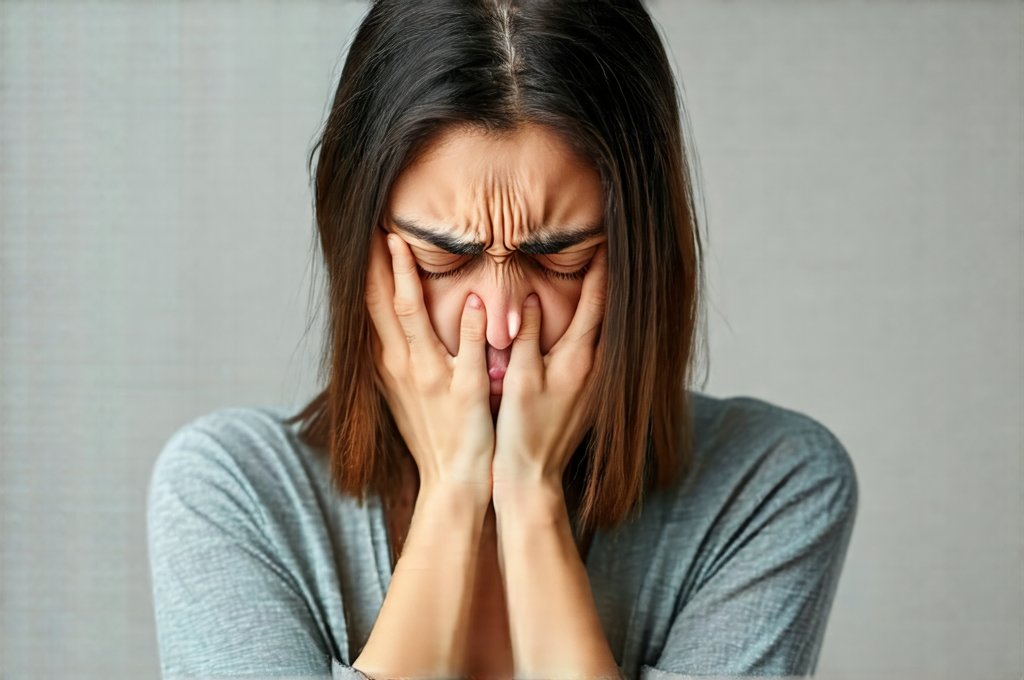Anxiety is a pervasive experience, often interwoven with physical ailments in ways we don’t fully understand. For many individuals living with chronic conditions like interstitial cystitis (IC), also known as painful bladder syndrome, the interplay between physical discomfort and emotional distress can be particularly challenging. The constant pain, urgency, and frequency associated with IC can trigger a cycle of worry, fear, and helplessness, leading to significant anxiety. This isn’t simply ‘being worried about having a medical condition’; it’s an amplified response, often fueled by the unpredictable nature of flares, the lack of definitive cures, and the impact on daily life. It is essential to understand that this anxiety is valid and directly linked to the lived experience of chronic illness.
The crucial point here isn’t to dismiss or minimize the physical symptoms of cystitis, but rather to recognize how profoundly they can affect mental wellbeing. The brain and body are inextricably connected; chronic pain signals constantly bombard the nervous system, contributing to heightened stress levels and ultimately exacerbating anxiety. Addressing this requires a holistic approach—one that acknowledges both the physical and emotional components of the condition. This article will explore practical strategies for calming anxiety specifically related to cystitis, focusing on understanding the connection between the two and offering techniques for managing symptoms and promoting overall wellbeing. It’s about finding ways to reclaim control and cultivate resilience in the face of a challenging chronic illness.
Understanding the Cystitis-Anxiety Link
The relationship between cystitis and anxiety is often bidirectional. This means that not only can cystitis cause anxiety, but anxiety itself can worsen cystitis symptoms. When we experience anxiety, our bodies enter “fight or flight” mode, releasing hormones like cortisol and adrenaline. These hormones prepare us for perceived threats, but they also have physiological effects that can directly impact bladder function. – Increased muscle tension, including in the pelvic floor muscles, which can exacerbate pain and urgency. – Heightened sensitivity to bodily sensations, making even mild discomfort feel more intense. – Disruption of the nervous system’s regulation of bladder control, leading to increased frequency and potentially flares. This creates a vicious cycle: cystitis causes anxiety, anxiety worsens cystitis, and so on.
Beyond these physiological effects, living with chronic pain inherently introduces psychological stressors. Individuals with IC often experience feelings of isolation, frustration, and loss of control over their bodies and lives. The unpredictability of flare-ups can lead to anticipatory anxiety—worrying about when the next flare will occur and how it will impact plans and daily routines. Furthermore, many people report feeling misunderstood by others who don’t grasp the debilitating nature of the condition. This lack of validation can contribute to feelings of hopelessness and further amplify anxiety levels. It’s important to remember that these are normal responses to a chronic illness; they aren’t signs of weakness or personal failings. If you struggle with differentiating your symptoms, it may be helpful to learn how to distinguish cystitis from other conditions.
Practical Strategies for Anxiety Management
Managing anxiety related to cystitis requires a multifaceted approach, combining practical techniques with self-compassion and support. One effective starting point is focusing on what you can control. While you may not be able to eliminate cystitis symptoms entirely, you can take steps to manage them effectively through lifestyle modifications (discussed later) and proactive anxiety management strategies. – Mindfulness and Meditation: Practicing mindfulness involves paying attention to the present moment without judgment. This can help reduce rumination on anxious thoughts and cultivate a sense of calm. Simple meditation exercises, even for just 5-10 minutes a day, can be incredibly beneficial. – Deep Breathing Exercises: Diaphragmatic breathing—slow, deep breaths that originate from the abdomen—can activate the parasympathetic nervous system, which is responsible for calming the body down. This counteracts the “fight or flight” response triggered by anxiety. – Progressive Muscle Relaxation (PMR): PMR involves systematically tensing and relaxing different muscle groups in the body, helping to release physical tension and reduce overall anxiety levels. – Cognitive Behavioral Therapy (CBT) Techniques: CBT focuses on identifying and challenging negative thought patterns that contribute to anxiety. Learning to reframe anxious thoughts can significantly improve emotional wellbeing.
It’s also vital to prioritize self-care activities that bring you joy and relaxation. This might include spending time in nature, listening to music, reading a book, or engaging in hobbies you enjoy. Remember that self-care isn’t selfish; it’s essential for maintaining your physical and mental health. Finally, building a strong support system—connecting with friends, family, or support groups—can provide invaluable emotional support and reduce feelings of isolation. Sharing your experiences with others who understand can be incredibly validating and empowering. Before undergoing any procedures that may increase anxiety, consider reading how to calm yourself beforehand.
Coping With Flare-Ups
Flare-ups are an inevitable part of living with cystitis, and they often trigger intense anxiety. Having a plan in place for managing flares can help you feel more prepared and less overwhelmed. – Identify Your Triggers: Keeping a symptom diary can help you identify potential triggers that exacerbate your symptoms. These might include certain foods, stress, or physical activity. Once you know your triggers, you can take steps to avoid them when possible. – Implement Your Self-Care Routine: During a flare-up, prioritize self-care activities that bring you comfort and relaxation. This might involve taking warm baths, using heating pads, or practicing gentle stretching exercises. – Communicate With Your Healthcare Team: Don’t hesitate to reach out to your doctor if your symptoms become unmanageable. They may be able to adjust your treatment plan or offer additional support.
It’s crucial to remember that flare-ups are temporary. While they can be incredibly challenging, they will eventually subside. Focusing on self-compassion and reminding yourself of this fact can help you navigate these difficult periods with greater resilience. Avoid catastrophizing—thinking the worst possible outcome will occur. Instead, focus on what you can do to manage your symptoms and comfort yourself during the flare-up.
The Role of Lifestyle Modifications
Lifestyle modifications play a significant role in both managing cystitis symptoms and reducing anxiety levels. – Dietary Changes: Certain foods and beverages can irritate the bladder and exacerbate cystitis symptoms. Common triggers include caffeine, alcohol, citrus fruits, spicy foods, and artificial sweeteners. Identifying and eliminating these triggers from your diet can significantly improve your comfort level. – Pelvic Floor Physical Therapy: Pelvic floor dysfunction is common in individuals with IC, contributing to pain and urgency. A qualified pelvic floor physical therapist can teach you exercises to strengthen and relax the pelvic floor muscles, improving bladder control and reducing symptoms. – Stress Management Techniques: As discussed earlier, stress and anxiety can worsen cystitis symptoms. Incorporating regular stress management techniques into your daily routine—such as yoga, meditation, or deep breathing exercises—can help reduce overall stress levels and improve wellbeing.
- Regular Exercise (Within Tolerance): Gentle exercise, such as walking or swimming, can release endorphins, which have mood-boosting effects and can help alleviate anxiety. However, it’s important to listen to your body and avoid activities that exacerbate your symptoms. Finding the balance between staying active and avoiding overexertion is key.
Seeking Professional Support
Don’t hesitate to seek professional support if you are struggling with anxiety related to cystitis. – Therapy: A therapist specializing in chronic pain or anxiety can provide valuable tools and strategies for managing your emotional wellbeing. Cognitive Behavioral Therapy (CBT) and Acceptance and Commitment Therapy (ACT) are particularly effective approaches. – Support Groups: Connecting with others who understand what you’re going through can be incredibly validating and empowering. Support groups offer a safe space to share experiences, learn from others, and build connections. – Medical Evaluation: Rule out other potential causes of anxiety and ensure your cystitis is being appropriately managed by your healthcare team. Sometimes, underlying medical conditions or medication side effects can contribute to anxiety symptoms. You may also want to investigate subclinical cystitis if you suspect something more is going on.
Remember that seeking help is a sign of strength, not weakness. It’s a proactive step towards reclaiming control over your physical and emotional wellbeing. You deserve to live a fulfilling life despite the challenges of chronic illness.





















